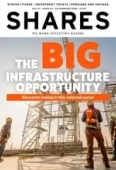Archived article
Please note that tax, investment, pension and ISA rules can change and the information and any views contained in this article may now be inaccurate.
Market relaxed about outcome of crucial European poll for now

Voters are set to turn out on 23 February for a general election in Germany which so far seems to have largely slipped under the market’s radar.
Despite being Europe’s most populous nation and its largest economy, US investment bank Morgan Stanley notes that, of investors who participated in a recent webcast on the election, just 52% had positioned themselves in any way for its outcome.
Meanwhile, the DAX index continues to serenely move to new record highs in the expectation we will see a coronation of the head of the centre-right CDU/CSU party, Friedrich Merz, as chancellor – despite the insurgent AfD party polling strongly in second place. Merz would replace incumbent Olaf Scholz whose SPD party is trailing in third place.
Writing around a week ago, Berenberg analyst Gerhard Orgonas laid out the likely scenario and the one the market appears to be pricing in. ‘Depending on how many of the smaller parties clear the minimum requirements to gain seats, a coalition will need a total share in the popular vote between 40% and 48% for a majority. No other party wants to work with the right-wing AfD, which sits in second place in the polls at around 20%.
‘The two main options for the CDU/CSU are thus either a coalition with the SPD (at 16%) or the Greens (at c4%). The former seems more likely because the SPD is doing a little better in the polls and because, unlike the Greens, it can currently block some legislation in the Bundesrat, the upper house of parliament.
‘According to current polls, the FDP will struggle to clear the 5% threshold to return to parliament. If it manages to do so and the leftist BSW also wins seats, Mr Merz may need the FDP as a third partner to put together a majority.’
The risk for markets is a more unpredictable outcome, particularly if the AfD outperforms expectations and/or Merz reverses his decision to rule out a coalition with the party.
Assuming CDU/CSU does prevail then Orgonas expects increased spending in areas like energy, defence and infrastructure. However, there are risks that a patched-up coalition might find it difficult to get things done.
Important information:
These articles are provided by Shares magazine which is published by AJ Bell Media, a part of AJ Bell. Shares is not written by AJ Bell.
Shares is provided for your general information and use and is not a personal recommendation to invest. It is not intended to be relied upon by you in making or not making any investment decisions. The investments referred to in these articles will not be suitable for all investors. If in doubt please seek appropriate independent financial advice.
Investors acting on the information in these articles do so at their own risk and AJ Bell Media and its staff do not accept liability for losses suffered by investors as a result of their investment decisions.
Issue contents
Feature
Great Ideas
Investment Trusts
Money Matters
My Portfolio
News
- Airbnb shares enjoy record day after strong Q4 and growth initiative
- Strong regulatory tailwinds keep XPS Pensions in the ascendency
- Wood Group shares hit an all-time low after review and cash flow revelation
- Is the Rolls-Royce recovery complete?
- Market relaxed about outcome of crucial European poll for now
- UK and European defence stocks surge as governments mull security spending hike
 magazine
magazine








